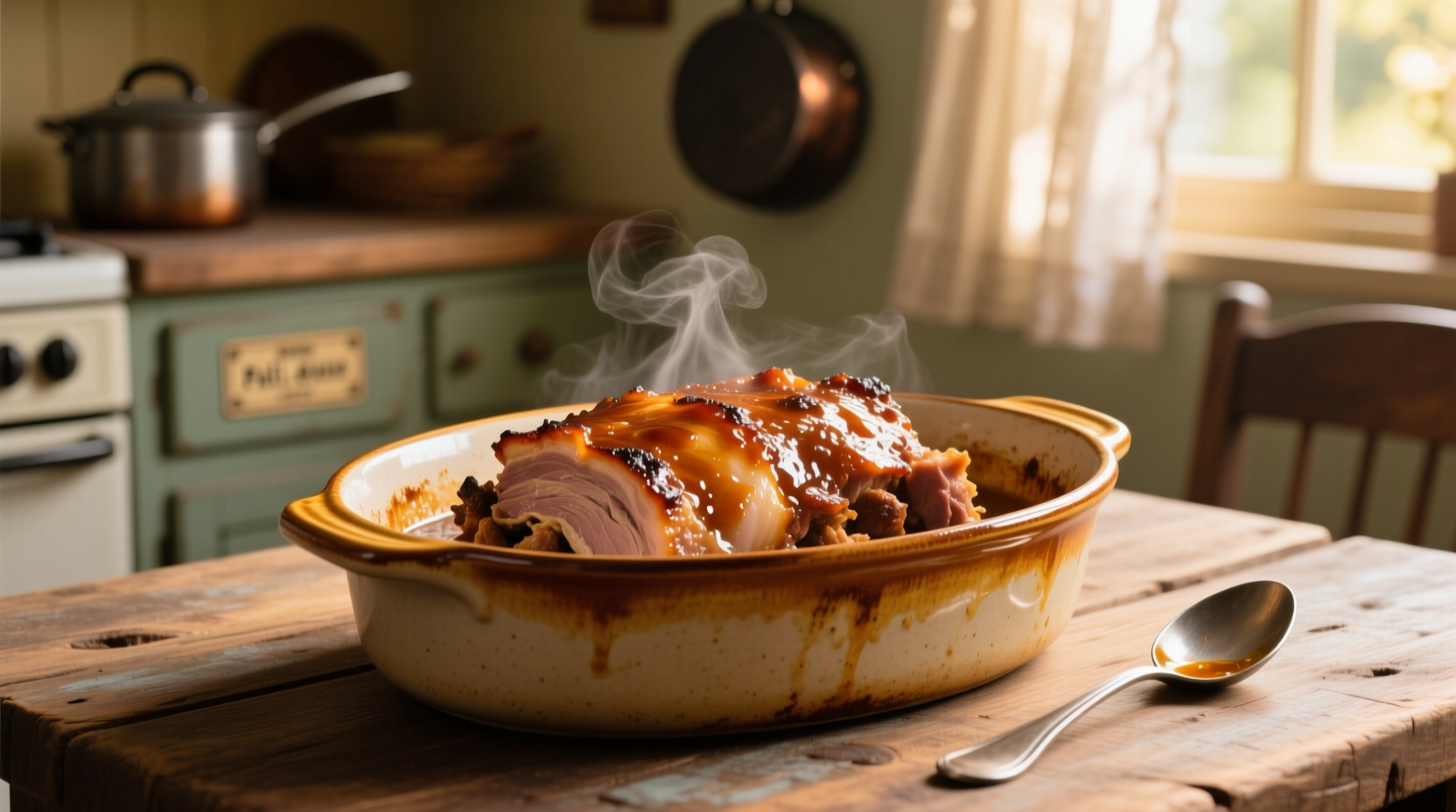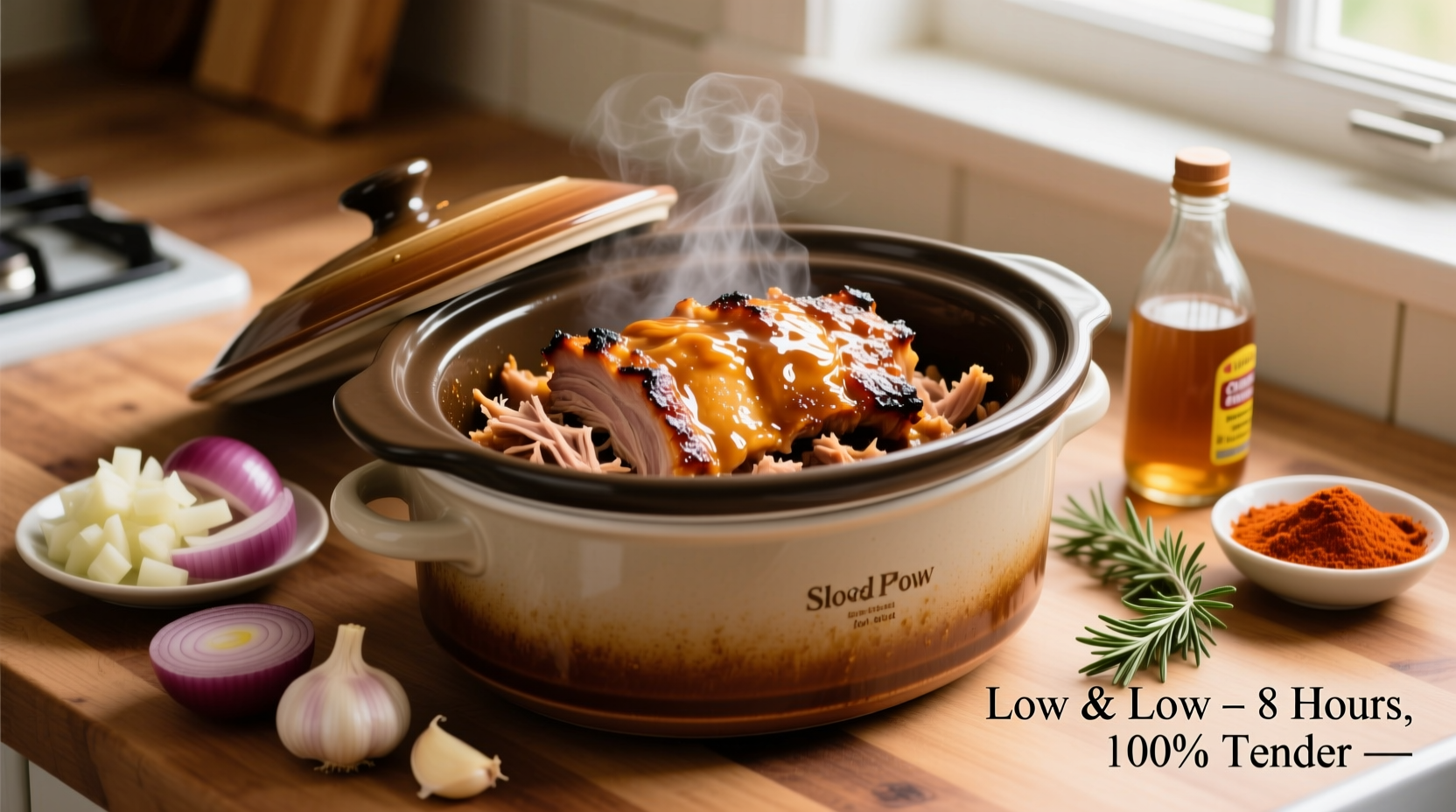Your Complete Guide to Foolproof Slow Cooker Pulled Pork
Imagine coming home to the aroma of perfectly tender pulled pork that falls apart with a gentle fork nudge. No babysitting the grill, no complicated techniques—just set it and forget it while your slow cooker works its magic. This method guarantees restaurant-quality results every time, whether you're feeding a crowd or meal prepping for the week.
Why This Slow Cooker Method Works Every Time
Unlike traditional smoking methods requiring constant temperature monitoring, slow cooking delivers consistent results with minimal effort. The low-and-slow approach breaks down collagen in the pork shoulder (also called Boston butt) into gelatin, creating that signature melt-in-your-mouth texture. Our tested method eliminates common pitfalls like dry or tough meat by maintaining the ideal temperature range throughout cooking.
| Pork Shoulder Weight | Minimum Cooking Time | Internal Temperature | Texture Result |
|---|---|---|---|
| 3-4 lbs | 7-8 hours | 195-205°F | Falls apart easily |
| 5-6 lbs | 9-10 hours | 195-205°F | Perfectly tender |
| 7+ lbs | 10-12 hours | 195-205°F | Restaurant quality |
What You'll Need Before Starting
Preparation takes just 15 minutes but makes all the difference in flavor development. Gather these essentials:
- Pork shoulder (3-6 pounds, bone-in for more flavor)
- Dry rub ingredients: 2 tbsp brown sugar, 1 tbsp paprika, 1.5 tsp garlic powder, 1 tsp onion powder, 1 tsp salt, 1/2 tsp black pepper, 1/4 tsp cayenne (optional)
- Liquid: 1/2 cup apple cider vinegar or broth
- Equipment: 6-quart slow cooker, meat thermometer, two forks for shredding
Step-by-Step Cooking Process
Prep Phase (15 Minutes)
- Pat pork shoulder completely dry with paper towels—this critical step ensures proper spice adhesion
- Mix all dry rub ingredients in a bowl, then massage thoroughly into all surfaces of the meat
- Place pork fat-side up in slow cooker (fat renders better this way)
- Add liquid to bottom of cooker—this creates steam that prevents drying
Cooking Phase (8 Hours)
Set slow cooker to LOW—never HIGH for pulled pork. Cooking on high creates tough meat by contracting proteins too quickly. After 6 hours, check internal temperature; continue cooking until reaching 195-205°F. The pork is done when a meat thermometer slides in with almost no resistance.

Shredding & Finishing (15 Minutes)
- Transfer pork to large bowl, reserving cooking liquid
- Remove and discard any large fat pockets
- Shred meat using two forks, working against the grain
- Skim fat from cooking liquid, then mix 1/4 cup into shredded pork for added moisture
- Adjust seasoning if needed before serving
Avoid These Common Slow Cooker Mistakes
Based on USDA Food Safety and Inspection Service guidelines, never cook pork below 140°F for extended periods. Our recommended 195-205°F range ensures both safety and optimal texture. USDA guidelines confirm pork is safe at 145°F, but pulled pork requires higher temperatures to break down connective tissue.
Other critical mistakes to avoid:
- Skipping the dry rub rest time: Let seasoned pork sit 30 minutes before cooking for deeper flavor penetration
- Overfilling the slow cooker: Leave at least 1/2 space at top for proper heat circulation
- Peeking too often: Each lift of the lid adds 20-30 minutes to cooking time
- Rushing the shredding process: Let meat rest 15 minutes after cooking for juicier results
Serving and Storage Tips
For authentic pulled pork sandwiches, serve on brioche buns with coleslaw. Leftovers keep refrigerated for 4 days or frozen for 3 months. When reheating, add a splash of broth to maintain moisture. According to the USDA Food Safety and Inspection Service, cooked pork should be consumed within 3-4 days when stored at 40°F or below.
Troubleshooting Your Pulled Pork
If your pork isn't shredding properly, it likely needs more cooking time—the ideal temperature range is 195-205°F. If too dry, you've either cooked it too long on high heat or didn't reserve enough cooking liquid. For lack of flavor, increase rub quantity by 25% next time or add 1 tablespoon Worcestershire sauce to the cooking liquid.
Frequently Asked Questions
Can I make pulled pork without a slow cooker?
Yes—you can use an oven at 275°F for 6-8 hours or an Instant Pot on high pressure for 90 minutes followed by natural release. The slow cooker method remains the most hands-off approach requiring minimal monitoring.
How do I know when pulled pork is done?
Pulled pork is done when it reaches 195-205°F internally and shreds easily with forks. The meat thermometer should slide in with almost no resistance. Visual cues include deep browning and separation between muscle groups.
Why is my slow cooker pulled pork dry?
Dry pulled pork typically results from cooking on HIGH instead of LOW, insufficient liquid in the cooker, or not incorporating cooking juices back into the shredded meat. Always cook on LOW and reserve at least 1/4 cup of cooking liquid to mix with shredded pork.
Can I leave pulled pork in the slow cooker overnight?
Yes—most modern slow cookers automatically switch to WARM setting after cooking completes. However, don't leave cooked pork in the 'warm' setting for more than 4 hours to maintain food safety. For longer storage, transfer to refrigerator within 2 hours of cooking completion.
What's the best cut of pork for pulled pork?
Pork shoulder (also called Boston butt or picnic roast) is ideal due to its high fat content and connective tissue that breaks down during slow cooking. Avoid lean cuts like pork loin, which will become dry and stringy when cooked for extended periods.











 浙公网安备
33010002000092号
浙公网安备
33010002000092号 浙B2-20120091-4
浙B2-20120091-4